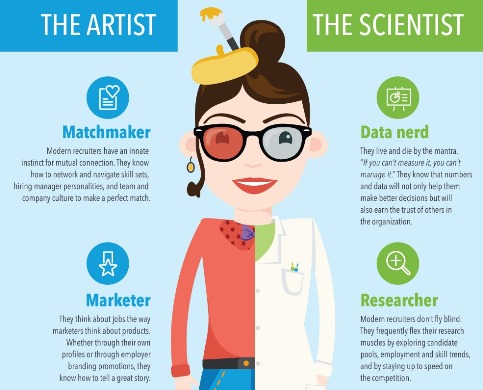7 Skills of a High-Performance Recruiting Team
With organizations still facing volatile and uncertain times, developing a killer recruiting team is more important than ever. Does your team have what it takes?
Today’s best talent leaders are part artists, part scientists. They bring a diverse mix of talent and expertise to their roles, including networking and negotiation skills, marketing know-how and a knack for digital recruitment tools and online platforms.
Effective HR leaders support their employees to develop these skills, and are able to build a cohesive team of motivated and passionate recruiters.
So what are the skills and traits that a high-performance recruiting team needs? Here are seven of the most important skills to cultivate.
1. Industry expertise
The best talent leaders understand that a successful recruiting strategy and talent brand rely on buy-in from the C-suite and collaboration with teams across the business, including marketing, communications and IT.
An industry expert has a deep understanding of their industry, the regions of operation and also know where the talent pools lie for various skill sets.
They often become trusted advisors to their organisations and have a seat at the table where company decisions are made.
2. Savvy sales
Today’s successful recruiters are savvy salespeople who don’t take no for an answer. It is essential that your team knows how to build a talent pipeline, nurture leads and close deals, and that they have the people and negotiation skills to secure the best deal for both sides.
3. Lateral, strategic thinking
Businesses today often need to recruit talent from the competition, so taking a long-term, strategic approach to sourcing talent and building a talent brand is crucial.
Building a robust talent brand is increasingly important to give you an edge over your competition. As business boundaries are blurring and the environment is constantly changing, recruiters must search for workers with new skills, from new industries and new geographies.
Great talent leaders take a big-picture view and work collaboratively with colleagues to develop or refine strong sourcing and branding plans that look beyond the most obvious active candidates and the current available positions.
4. Proficiency with social media and online marketing tools
The best talent leaders look at recruitment through a marketing lens. They know how to tell a great story, they use that skill to boost their company’s talent brand and they can craft outstanding job advertisements, as well as company and personal profiles.
They also know how to target the right candidates with the right story and take a multi-channel approach to talent branding. Using tools like the Talent Brand Index to benchmark with industry and competition and measuring ROI is also the mark of the best talent leaders.
5. A master in the art of networking
Recruitment is a bit like matchmaking – and the best recruiters know how to spot the perfect match, whether the candidate is actively looking or not.
Passive candidates comprise 75% of the global professional workforce , but good talent leaders know that most of these employees are open to new career opportunities, and they use their online and ‘physical’ networking skills to find and engage passive candidates.
They also know the importance of understanding the needs and aspirations of candidates and relating it back to the role on offer. Great talent leaders will stay connected with prospective future recruits and track their career paths and movements.
6. Adept at technology – or keen to learn
Encouraging your team to take advantage of technology to maximise candidate quality and personal productivity will be key this year. A savvy recruiter believes in the power of digital tools and platforms such as LinkedIn, applicant tracking systems and CRM systems, and they have the technical know-how to get measurable results.
7. Accurate and insightful interviewing
Some recruiters have a sixth sense for spotting that perfect candidate, and it’s essential to your team. They have exceptional interview skills and know to focus their interview discussions on the candidate’s performance, motivation and cultural fit. They ask insightful, open questions based on their deep understanding of the role and the business’s needs.
Building a high-performance team is a crucial part of your organisation’s approach to acquiring top talent, but there are many other elements that make up a strong recruitment strategy. Check out our free mini guide Five steps for crafting a killer social recruiting strategy to discover and find out how to get started.

